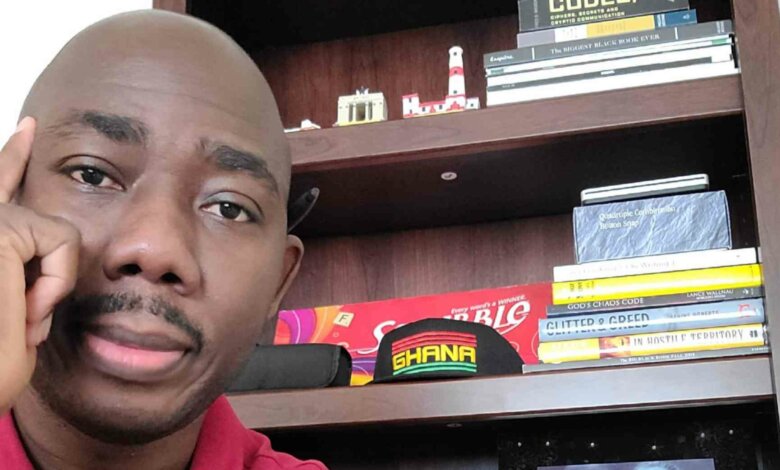
Sickle Cell Disease (SCD) affects about 20 million individuals on the planet. Meanwhile, while some people with the condition experience lifelong discomfort and problems, others feel it mildly.
In the body, red blood cells are typically flexible discs that can pass through blood vessels with ease. However, with SCD, red blood cells become crescent-shaped or “sickle” shaped. These stiff, difficult-to-move cells can restrict blood flow to other parts of your body, causing problems.
It is generally a genetic illness and two persons who have the sickle cell disease may not experience it in the same manner.
For Oral Ofori, he believes living through the pain for the past 42 years has been a personal battle only a warrior can survive. Oral was born on January 26, 1980, in Tema, a popular harbor city in Ghana which is close to the country’s capital city of Accra.
He is a Ghanaian-American award-winning digital media producer and blogger, freelance journalist, entrepreneur, and writer. In an interview with theafricandream.net, he laid it out what living with SCD is like for him. Below is the transcript:
While growing up did you feel SCD will affect your dreams?
Getting sick while other kids were healthy was not very convenient but I never looked down on myself or my dreams, instead I chased it. I have always had a passion for writing and the likes, so about five years after completing Chemu Senior High School in 1998 in Tema, I left the shores of Ghana for the UK to place my first dream block.
Are you still chasing that dream?
Of course, like every human out there. If there’s one thing SCD has given me, it’s the persistence to prove that I can achieve greatness in the face of pain. I studied journalism at the London School of Journalism and graduated in 2006.
Living with sickle cell disease is not a death sentence, it’s a divine opportunity to love and live life in a way that makes us all warriors”
Oral OfoRI
In the following year, I began an internship with the Voice of America (VOA) in Washington, D.C as a radio news reporter and contributor. I founded TheAfricanDream LLC, an information and communication consultancy firm in the Washington D.C. metro area in 2015.
Now, I am the head of the Customer Relations Office of the Embassy of Ghana in Washington D.C. in December 2021. It has been a life of fulfillment for me.
Do you have hobbies?
Ah well, my hobbies. I like reading and writing. I guess my hobbies led me to blog and eventually to found a communication consultancy I talked about earlier — TheAfricanDream LLC — through which I seek to bridge Africa and the African diaspora.
Does your SCD cause you much pain?
Excruciating pains called sickle cell crisis are mostly what I battle with, coupled with infections and fatigue that I try not to complain too much about, but sometimes the human in me throws in the towel, it can be a little bit unbearable.
In such times I am ever grateful for my wife who is a nurse, and the positive urge I get to try again for my kids. I like to call myself a warrior instead of a survivor.
So how do you treat your SCD crisis?
I take zincovit and folic acid when I have sickle cell crisis. I am led to believe the folic acid, B-complex, and zincovit/bencovit, provide vitamin and mineral supplements that I take will counteract the continuous hemolysis of the red cells, and prevent growth deficit.
Secondly, paracetamol, diclofenac, ibuprofen, and morphine are good pain-killing and anti-inflammatory agents I switch for use.
Read Also: COVID-19 initiative by Oral Ofori recognized by German nonprofit alliance
What if your drugs are out of reach?
When my drugs are out of proximity, I drink a lot of water and other fluids when my symptoms start. Staying hydrated can help you head off the worst of an attack. Sometimes when I am home, I use a heating pad or take a warm bath, I try a massage, or relaxation techniques like meditation.
Or I just do something to take my mind off the pain; like Watch TV with my children, or listening to music, mostly a lot of oldies but goodies, or I talk to my wife or sister since they’re my world, or I might randomly call my in-laws just to check in on them, don’t ask me why but all the above have soothing effects on me.
In terms of getting treatment, what is your experience with the healthcare system?
I reside in the United States, so I’ll speak based to that. What I feel is the health care system in U.S. is not ethnically-sensitive, and new immigrants struggle to access it, obviously because some of them are not permanent residents or green cardholders. Even when they become citizens, sometimes, they still have a myriad of issues because it’s not ethnically-sensitive.
With that I mean certain conditions are peculiar to black people and sickle cell is one of them. And when you are talking to someone who does not understand your culture, it’s difficult for you to even feel free or comfortable around them, this is why ethnic insensitivity gets in the way, it goes beyond language barriers.
For the most part, immigrants when they are sick, prefer not to go to the hospitals. They prefer to seek treatment on their own because healthcare at the hospitals is expensive in the U.S.
Secondly, they might not have their papers with the immigration systems correct. So they either self-medicate or use unorthodox means to find curated measures for whatever conditions they might be going through with sickle cell.
Getting sick while other kids were healthy was not very convenient but I never looked down on myself or my dreams, instead I chased it”
Oral Ofori
Have you ever considered a permanent cure?
Yes, but it’s more complicated than it sounds. I know of bone marrow transplant, and that’s seriously expensive. Firstly, you have to find a match. And once you find one, you then have to spend all that money to get the procedure for the permanent cure. Some people, because of the money involved, would prefer not to go that route.
So in order to get more black folks getting the bone marrow transplant more of us must be encouraged to register with the Bone Marrow transplant centers. So that when there is a need for a transplant, finding a match wouldn’t be extremely difficult.
It’s hard for SCD sufferers of color (especially blacks) to avail of themselves for clinical/drug trials because of how dishonest the U.S. has been with them in the past. Thankfully though, things are changing slowly, but more work needs to be done on all sides I believe.
I believe the American Healthcare system can manage conditions of SCD, if more efforts are putting into letting people know how to eat right and also improve access to medical Marijuana, as long as it’s not abused.
Read Also: Customer Service in Ghana – the need for Attitudinal Change is Past Due | Oral Ofori
What is your hope for the future treatment of SCD?
Hope for the future is no longer a dream, it is happening though relatively new. The Clustered Regularly Interspaced Short Palindromic Repeats (CRISPR) gene editing technology is allowing the use of cells taken from patient’s bone marrow that will be genetically modified with CRISPR to make them produce a protein that is usually only made by fetuses and by babies for a short time following birth.
The hope is this protein will compensate for the defective protein that causes sickle cell disease and enable patients to live normally for the rest of their lives.
The commercialization and affordability of such complex medical procedures are what should be the concern of everyone concerned about SCD treatment among the other concerns I’ve raised earlier. So, the need to be loud about SCD because it requires a lot of support to make these process possible for every patient is necessary.
Living with SCD is not a death sentence, it’s a divine opportunity to love and live life in a way that makes us all warriors, even if only for ourselves and families – society is watching and we must keep talking about this and supporting each other.
Source: TheAfricanDream.net

Abeeb Lekan Sodiq is the Managing Editor of theafricandream.net, a pan-African news website subsidiary of US-based TheAfricanDream LLC. He is also a Human Resource Practitioner, and a freelance Graphics Designer. He has worked with prominent personalities, including ambassadors, secretariats, international organisations, universities, celebrities, NGO, and media firms.





